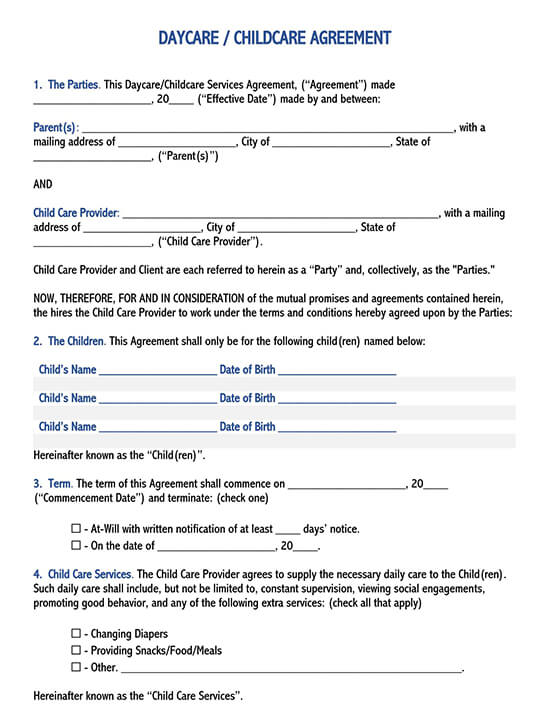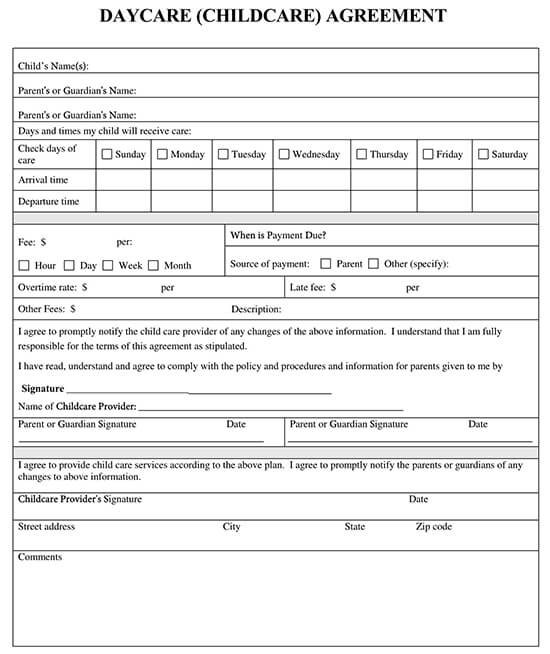Contracts are essential for child care providers. These can help protect your business from potential liability, but they also provide operational support to define the parents’ responsibilities and the school itself. Whether you are a new parent or a potential nanny, working with a professional contract writer can be very reassuring for both parties.
Free Child Care Contract Templates



How Important are Child Care Contracts
The importance of the contract lies in the fact that it is a written document in which the obligations and responsibilities assumed by each of the parties involved are reflected. Thus, in the event that either party fails to comply and it is necessary to resort to justice, the process will be much simpler, shorter, and less expensive.
For this reason, contracts are something that child care service providers should not leave for later or in the hands of anyone. From the beginning, all relationships between parties must be formalized because, in this way, everyone gains security, and possible future expenses are avoided.
A good contract put in place is the best guarantee that future problems with the client will be minimized. Do not be afraid of being too drastic in your contract; then you can always be more flexible if the relationship with your client deserves it.
Components of Child Care Contracts
All contracts should include necessary information, such as:
- Names of all the parties involved: The name of the child and the names of the service providers (nanny, helper, etc.)
- Age: The age of the child or children
- Contact information: The contact information of parents or guardians
- Payment details: The payment terms should be clearly explained and include the forms of payment accepted on the due date, any overtime or late payment rates, the deposit owing (if any), and special rates for holidays and leave.
- Rates: The rates you will charge the parents for the daycare service will depend on the age of the child, the duration of his stay, and any special service you are going to provide, so it is best to leave this section initially blank.
- Opening and closing hours: Opening and closing hours/working hours of the child care center
- Vocation: You should include the vocations section in your contract if you are going to be closed at a certain time during the year. This will notify parents that they will have to take care of their child for that particular period.
- Food and beverages: Most parents are concerned about what their child is going to eat in the daycare center, so it is best recommended to add a food and beverage section to show parents that you will be providing a proper, safe, and healthy diet to their children.
- Additional costs, such as late payment and site visit fees: Additional costs for special or exceptional cases
- Key signatures guarantee that the contract can be executed in court: The signatures of all the important or major people involved
- Termination Procedures: Contracts can also discuss termination procedures, including what it means for parents to terminate short-term services. There must be a clause stating that you will continue to be paid at the end of your employment, whether the child is dependent on you or not.
They can also discuss various policies that answer different client questions and help avoid misunderstandings with parents. For parents, working with a trusted child care provider with clear standard guidelines can mean greater peace of mind. Going back to work or working longer hours after having a baby is stressful for new parents. They want to be sure that their child is well taken care of.
Types of Daycare and Child Care Centers
- 24-Hour Daycare Center: This type of daycare service is available 24/7, and you can keep your child there for a while without having to worry.
- Center-Based Daycare Center: It is the most common type of facility. It can be public or private. In such centers, several caregivers provide services.
- Home-Based Daycare Center: It is another common type of child care center. In home-based centers, a nanny is usually in charge.
- Infant/toddler Daycare Center: As the name suggests, this kind of center is for infants and toddlers. In such centers, extra care is given to infants and toddlers.
Different Names for Child Care Contract
The following are different names that are used to refer to child care contracts:
- Child care Services Agreement
- Child care Agreement
- Babysitting Contract
- Daycare Contract
- Nanny Contract
Creating a Home-Based Child Care Contract
The home-based child care contract must be made in duplicate. Both the employer and the caregiver must sign both copies. When you register the domestic worker with Social Security, you must provide a third signed copy of the contract.
The employment contract for a domestic worker must include:
- Duration of work: temporary or indefinite
- Start date: As well as the address at which the care of the children will take place. If it is a temporary contract, you must indicate the date of completion of the work.
- Days: It will be full-time when the nanny works 40 hours a week. The shift will be part-time if it is less than 40 hours. It is considered hourly work when the caregiver works less than 120 days a year.
- Holidays: A minimum holiday period of 30 calendar days a year must be established.
- Salary: In addition to the two annual extraordinary payments, you must take into account other factors. The nanny’s salary must be at least the minimum inter professional salary.
- Tasks: Although families do not usually include the caregiver’s functions, it will avoid misunderstandings when working at home. It is better to have everything in writing.
Rules to be included in the Contract
Contracts with child care providers should detail a wide range of policies. Your policy should include important disease guidelines that cover several topics, such as the following:
- What steps are you taking to reduce the risk of illness?
- When do you send your child home?
- When should children stay home when they are sick?
- When can they go back to kindergarten?
- How are injuries and emergencies treated?
- What about preventive care if you, as a caregiver, get sick? How would it work? Is there a replacement?
- Discuss medical records and how to keep them up-to-date, when to update them, etc.
- Other guidelines to consider when entering into child custody agreements
- Rules for outdoor play
- Guidelines for traveling outside the home to care for a child
- Delivery terms of toys at home
- Guidelines for mealtimes
- Rest and sleep guidelines
- Guidelines for potential training
- Diaper change
- Curriculum
- Accessories
- The rules of conduct for children
- Policy for reporting suspected child abuse and neglect
- Collection policy
- Authorization Policy (Situations that may require written authorization)
Reviewing an Agreement or Contract
Some child care centers want to review agreements with parents several times a year, or at least once a year. When you check the contract with your parents, have them sign and date each page, so there is no doubt whether they understood each section. If there comes a time when you feel the need to change the contract or make changes to your policy, it is recommended that you give the parent time to adjust. Consider giving them two to four weeks’ notice so they can plan accordingly.
Frequently Asked Questions
Your ID card or passport, birth certificate of the child, and residence permit If you come from a country that does not belong to the European Union and have a social security card.
How long it takes to enroll your child(ren) at a child care center varies, but usually it does not take more than 2-3 days.
No, they don’t ensure supervision of the child at all times unless it is mentioned in the agreement.
Conclusion
Anything associated with children is sensitive. That is why it is important to create a daycare contract prior to providing such services, as it protects you against any legal issues and defines your responsibilities. While creating a daycare contract, you should include everything clearly.












